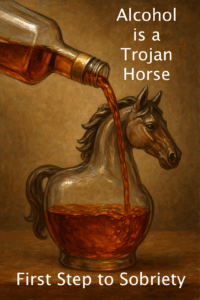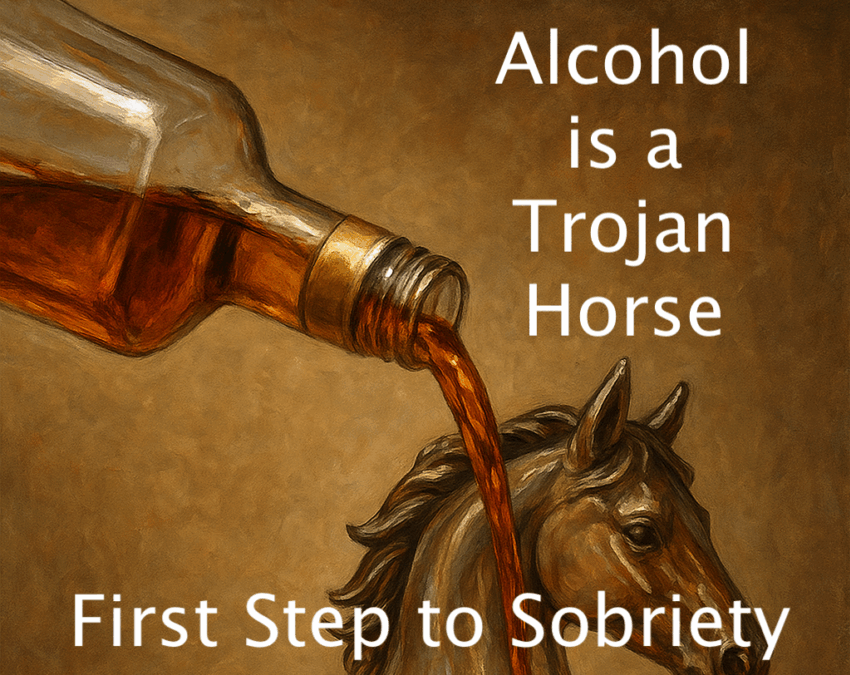Step One to Sobriety
We admitted we were powerless over alcohol—that our lives had become unmanageable.
Who’s the Boss of You?
Once I heard two children arguing, and one of them said to the other,
“You can’t tell me what to do. You’re not the boss of me.”
Truthfully, we are a lot like that child. We don’t want anyone to be “the boss of us.” We want to manage our affairs and make our own decisions. Many don’t like taking advice from others. The irony of any addiction is that the drug of choice becomes the boss of the user.
Friends of a person with an addiction see signs that their life is spinning “out of control.” But when that person is confronted out of love, the response is often the same as that child, “You are not the boss of me.”
Alcohol is a Trojan Horse
For some, alcohol grabs hold early and never lets go. It starts early—sometimes in teenage years or in college, with friends after work, or at weekend gatherings. Its effect on the mind and body feels relaxing, even comforting. And one does not even have to be addicted to be affected by overuse or someone else’s use. But there’s much more. It’s the cumulative effect of alcohol that quietly erodes health, home life, emotions and relationships.
Alcohol is a Trojan horse in our cupboards. It hides in coolers at backyard barbecues, shows up at weddings, tailgates, and lakeside refrigerators. It is there at the office party, on the golf course, on the fishing trip, and at dinner with friends. It seems innocent enough because most of the time, there isn’t a devastating effect or event that happens after drinking. Most people can drink in moderation with no issues. However, for far too many people, alcohol has a devastating effect on life. It is the slow, methodical eroding of health—both physical and relational—that makes alcohol abuse so dangerous.
I know, many of you saw the word “abuse,” and you’ve already said, “I don’t abuse alcohol. I use it, but I don’t abuse it.”
Part of the problem for those who use alcohol regularly is that they build up a tolerance and begin drinking more over time, as the same amount of alcohol does not give a person the same effect as it once did. People who develop an addiction can no longer stop after one drink.
There is a slippery slope that develops as people use the drug to relax in the evenings and wind down from stress. After many years of doing this, many slowly slide into a dependency—most alcoholics used to be occasional or moderate drinkers.
The Numbers Don’t Lie
Where there’s a party of at least ten people, statistically, one person can’t control their drinking. If half of Americans drink, that means millions live unmanageable lives because of alcohol.
Alcohol is the boss. It speaks, demands, controls, and dictates.
The Cycle of Control—and Denial
Some can go days or even weeks without drinking, which feeds their denial. But once an alcoholic opens that first beer, bottle, or pours that glass, they cannot stop.
The results?
- Family conflict
- Missed engagements
- Consuming debt
- Broken relationships
- Embarrassing episodes
- Injuries
- Job Loss
- Arrests
- Failing Health
- Death
Many alcoholics forget entire periods during drinking episodes. Some hide their addiction for years, from friends and family. Many become skilled at hiding their addiction. These “skills” feed the lie they tell themselves that they are in control. Denial and pride keep them from seeking help. Most are good liars. The biggest lie is the lie alcoholics tell themselves — that they are in control and that they don’t need help.
Wanting to Quit… Sort Of
Some alcoholics want to quit—kind of. They feel guilt and shame, knowing their habit is unhealthy. They may hide their use of alcohol to avoid judgment or lectures from a member of their family. Some admit privately—if only to themselves—that alcohol makes them feel worse, not better, especially after binge drinking.
One thing I’ve heard repeatedly from those who achieve sobriety:
“It made me feel good, but only for a little while. Afterwards, my body and soul felt worse.”
For many alcoholics, it takes a jolting bit of reality to bring them out of denial and cause them to put forth the effort to cut their addiction loose.
For some, it is a doctor telling them they are going to die if they don’t stop drinking. For others, it is an arrest. For some, it is the threat of a broken relationship, constant arguing with a spouse, or an embarrassing episode at a party. Why wait until this kind of event comes before you change your life?
Romans 7:15 – Did the Apostle Paul Understand Addiction?
I’ve wondered if the Apostle Paul wrestled with an addiction of some kind. I know he understood our addiction to sin. Romans 7 speaks to this. It is in verse 15 that I think captures the addict’s mind perfectly:
“For I do not understand my own actions. For I do not do what I want, but I do the very thing I hate.” — Romans 7:15
Some Don’t Want to Stop
Let’s be honest:
If you do not want to stop drinking, you will not.
If you love alcohol more than life, health, family, friends, children, or God, you will keep drinking.
I’ve seen a common pattern of behavior for those who don’t want to stop. A person will reach out for counseling, but after a session or two, this person decides that he/she is not ready to stop drinking. Sometimes, all a person wants is to make those close to him/her think he/she is serious enough to stop harassing them about their drinking. This person will come just long enough to satisfy that person and figure out how they can continue drinking. This will last until the next moment of crisis.
Step One: Admit Defeat
Those who seriously want to be delivered from alcohol have to commit to a long journey. The journey is a life-long journey of abstinence. It is a journey filled with self-reflection, forgiveness, honesty, confession, prayer, openness to change, a willingness to listen to God and the hope of restoration with others. You cannot attempt this journey alone. Some do this with a group of other alcoholics. Others do this in counseling. Some find long-term programs. I’ve had the privilege of working with many in counseling and seeing the miracle of change take place in people’s lives.
It is difficult to improve on the proven steps of Alcoholics Anonymous.
The first step to sobriety is to admit defeat.
You acknowledge that alcohol has beaten you.
Some pride themselves on “holding their liquor.” Others deny a growing tolerance until it overtakes them.
Alcohol is a powerful drug.
If you cannot drink in moderation—if one beer or one glass of wine always leads to more—you are powerless over it.
And because you cannot stop, alcohol has contributed much of the brokenness in your life.
No More Bossing You Around
You cannot allow alcohol to be the boss of you any longer.
If you can say,
“I am powerless over alcohol—that my life has become unmanageable.”
You’ve taken your first step toward freedom.
Alcohol Is Not Your Friend
Alcohol is your enemy. It will not help you.
Those who drink may still be your friends, but they are not helping you when they drink around you or invite you to join them while they drink.
From here on, life must change—if you are to find peace, wellness, restored relationships, better health, and renewed happiness, you need to change.
It is time to pour out all of your alcohol! All of it! Get it all out of the house.
Change your environment. Stop going to places where you typically order alcohol or drink alcohol. If not, you will continue to drink. You are not strong enough to say, “No.”
If you hang out with friends or family who drink, be humble and tell them whatever feels comfortable to you.
- You no longer have any tolerance for alcohol
- You’ve changed your lifestyle, and that involves cutting out alcohol
- You’ve discovered that your body and alcohol are not friends
- You are only drinking no-calorie drinks
It doesn’t matter exactly what you say—but if your friends cannot honor your boundaries, then you will have to change friends. Otherwise, you cannot stop drinking.
Once you can say Step One – you admit that you are powerless over alcohol—that your life has become unmanageable, and once you have gotten rid of the Trojan Horse from your house, you are ready for Step Two. Look for Step Two in my next article.

